HWPL Hosts Webinar on “Multilateral Approach to Climate Human Rights” and the Declaration of Peace and Cessation of War (DPCW)
On February 1, 2024, HWPL organized a webinar titled, “Multilateral Approach to Climate Human Rights.” Since July 2022, HWPL has hosted webinars to inform citizens of South Asian countries — including India, Bangladesh, and the Maldives — about the realities of climate change and the need for human rights protections.
The webinar was successfully conducted with more than 80 participants, including human rights activists, law professors, lawyers, civil society leaders, and students from eight countries: India, Bangladesh, Maldives, Sao Tome and Principe, Afghanistan, Pakistan, the Philippines, and the Marshall Islands. The online seminar focused on addressing the human rights situations in countries threatened by climate change. Both nations and civil society organizations were urged to consider the need for peace and human rights protections.

Experts from various fields who delivered remarks during the human rights webinar included: Kamal Hossain from the HWPL International Law Peace Committee (ILPC); the former law minister of Bangladesh and former vice-president of the International Law Association (ILA) of the Bangladesh Branch; Aminath Shauna, former minister of the Ministry of Environment, Climate Change and Technology in the Maldives; Hiroshi Yamamura, former minister of public works and current senator of Utrok Atoll in the Marshall Islands; and Sunil Zode, chairman of the Indian Chamber of Commerce for Affirmative Action (ICCAA) and the National Council for Legal Awareness.
“Climate change has become a significant obstacle to the realization of human rights. It has a direct impact on human rights, in particular, threatens the right to adequate food, adequate water, right to shelter, right to health, right to adequate housing, and self-determination,” said Dr. Kamal Hossain, a member of the HWPL International Law Peace Committee (ILPC). “I hope and wish that this webinar organized by HWPL shall contribute towards the protection of climate change.”
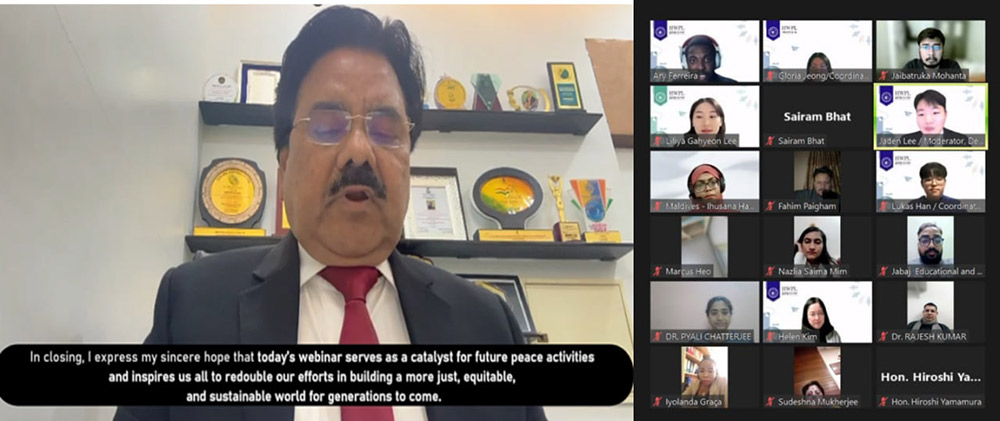
Sunil Zode, chairman of the Indian Chamber of Commerce for Affirmative Action (ICCAA) and the National Council for Legal Awareness, shared his thoughts on the role of businessmen in addressing climate change.
“They should prioritize sustainable practices, invest in renewable energy, minimize carbon emissions, and integrate climate resilience into their business strategies,” Zode said. “By taking proactive measures, businesses can not only mitigate their environmental impact, but also contribute to the country’s efforts in addressing climate change and building a more sustainable future. The pursuit of peace is not a solitary endeavor but a collective journey. It is a journey that requires empathy, courage, and unwavering commitment to upholding the rights and dignity of every individual, regardless of their nationality, ethnicity, or creed.”
Following the speeches, three presenters discussed the policies that individuals and nations should adopt to address the challenges posed by climate change, focusing on achieving climate peace and protecting human rights.
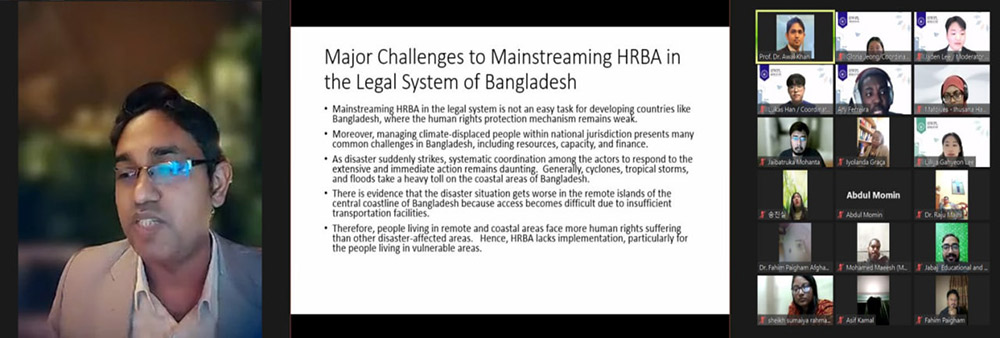
“[The] human rights-based approach seeks inequalities which lie in the heart of development problems and the discriminatory practices and unjust distribution of power that impede development progress and often result in groups of people being left behind,” said Dr. Md Abdul Awal Khan, a professor from the law department at the Independent University in Bangladesh.
“So major elements of the Human Rights Based Approach (HRBA) — we can mention that it is a governance problem that means transparency, and accountability. This is one of the major challenges that we face in developing countries and states. Ensure that human rights-based approach [exists] in the legal system of Bangladesh or legal and policy framework and then we’ll be provided a better support for the climate-displaced people or climate-affected people.”
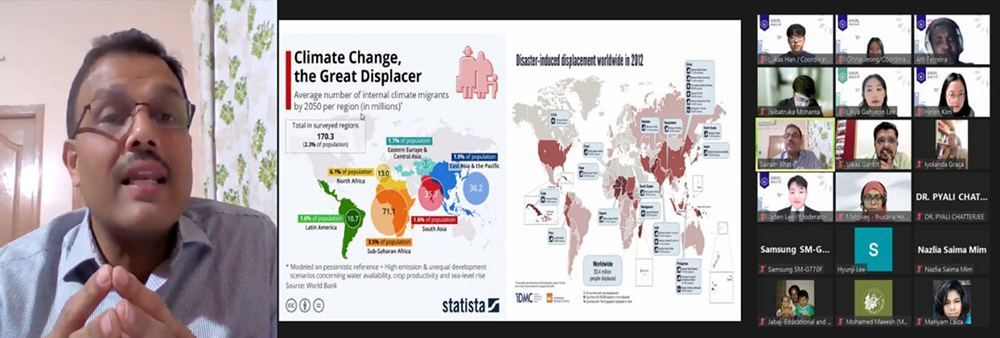
Dr. Sairam Bhat, professor of law from the National Law School of India University (NLSIU) in Bengaluru, India and coordinator for the Centre for Environmental Law Education, Research and Advocacy (CEERA), also shared his thoughts, emphasizing that it is imperative to view protecting climate human rights as a duty of humanity and a way of cultivating peace.
“Climate change is not a myth — let’s face it. I think some leaders think it’s a myth but it’s not a myth because countries are facing the real challenge. I think the biggest impact of climate change is going to be on basic human rights. It is going to be on communities that are vulnerable and poor,” Dr. Bhat said. “So I think we all owe a duty to share our wealth, to share our knowledge, to empower communities who are at the risk of climate change.”

Uza Ihusana Hamid, a lawyer from the Maldives, explained that establishing relevant laws and regulations is essential to make the public understand the importance of human rights amid climate change.
“I think and I firmly believe that the state should take an active role on the frontline to raise awareness among the public. And this involves making the public aware of the recent acts and regulations. We need to establish a connection between these acts and regulation with the fundamental rights,” Hamid said. “I firmly believe that individual actions can yield substantial positive effects. So, it is imperative to recognize that just as humanity relies on nature, nature equally depends on our respect and preservation efforts.”
The webinar provided an opportunity for participants to express their thoughts and opinions. They shared heartfelt sentiments about the importance of climate change and the necessity of protecting climate human rights, while also fostering solidarity with nations and civil society.
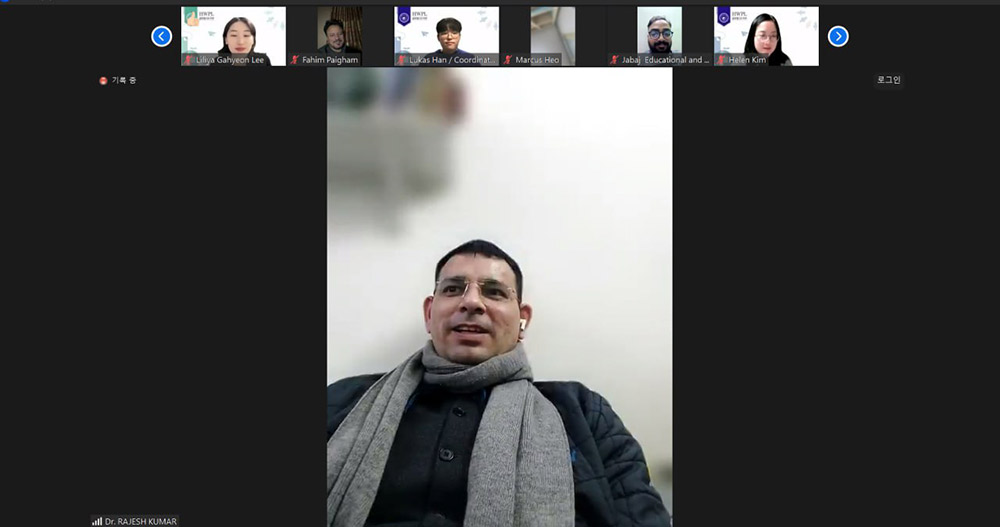
“The countries who are going to host these migrants will face many kinds of challenges — cultural challenges because these countries might be having a different socio-religious backing and when they are moving to another country, the host country would certainly be facing some kind of conflict with the migrant population. That would further escalate the issue of violence and other kinds of human rights violence,” said Dr. Rajesh Kumar, assistant professor and law faculty member from the University of Delhi, who emphasized the need to address the challenges posed by climate change.
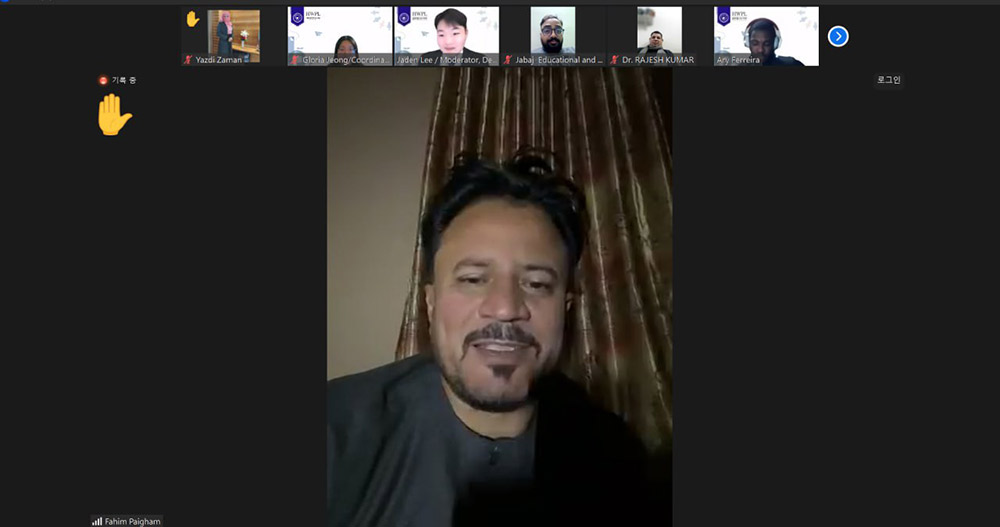
Mr. Fahim Paigham, CBC Manager for Care of Afghan Families for Community Development Organization (CAFCDO) & UN Women, expressed gratitude to HWPL for providing a platform through webinars to share the vulnerable reality of climate change in Afghanistan.
“Because of the poor economic situation in regime-changing Afghanistan, people are more at risk of climate change,” Paigham said. “The situation of natural disasters regarding the climate — because of dirty air pollution particularly in this winter season — the capital of Afghanistan is most dangerous.”
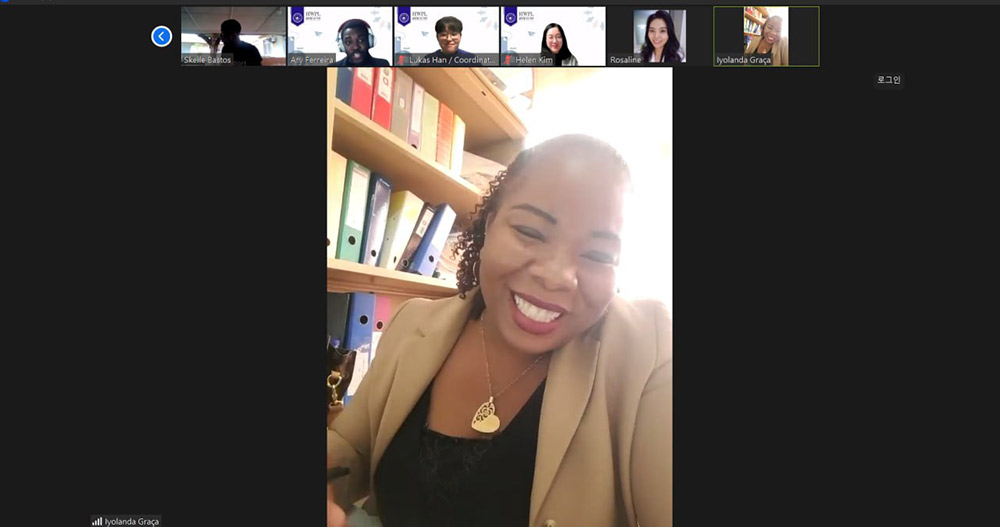
Ms. Iyolanda Graça, advisor of the Minister of Justice for Communication and Image from São Tomé and Príncipe, also participated in the human rights webinar, hoping for more detailed discussions on climate change.
“Climate change and human rights are not just one country’s problem, but everyone’s problem,” Graça said. “The Maldives and Sao Tome and Principe are the same island countries but have different climate change situations. To address these issues, it is important that we raise awareness of the issue of climate change.”
Climate change poses the greatest threat to humanity in the 21st century and is related to other issues, including climate security, climate inequality, climate rights, climate diplomacy, and climate refugees. To promote international solidarity and commitment to addressing these concerns, HWPL plans to submit annual reports on the Multilateral Approach to Climate Human Rights Project (MAC Project) to the United Nations Human Rights Council. Through these efforts, HWPL hopes to enhance interaction between states and civil society organizations to ensure the effectiveness of human rights policies.
Additionally, in accordance with Article 10 of its framework, the Declaration of Peace and Cessation of War (DPCW), HWPL will conduct activities worldwide to further spread a culture of peace, including organizing discussions regarding the relevance of human rights in the face of climate change and the institutionalization of peace through education and campaigns.













